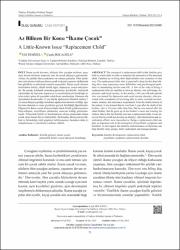| dc.contributor.author | Temizel, Elif | |
| dc.contributor.author | Hocaoğlu, Çiçek | |
| dc.date.accessioned | 2023-09-25T08:03:04Z | |
| dc.date.available | 2023-09-25T08:03:04Z | |
| dc.date.issued | 2023 | en_US |
| dc.identifier.citation | Temizel, E. & Hocaoğlu, Ç. (2023). A Little-Known Issue “Replacement Child”. Turkiye Klinikleri Pediatri, 32(1), 71-74. http://doi.org/10.5336/pediatr.2022-92466 | en_US |
| dc.identifier.issn | 1300-0381 | |
| dc.identifier.uri | http://doi.org/10.5336/pediatr.2022-92466 | |
| dc.identifier.uri | https://hdl.handle.net/11436/8376 | |
| dc.description.abstract | The concept of a replacement child is that families give birth to a new child in order to maintain the memories of the deceased child. Families try to bring their dead children into existence in this way. The replacement child, who is expected to keep her/his dead sibling alive, may experience some difficulties and psychological problems in maintaining her/his own life. A few of the risks of being a replacement child are inability to form an identity, low self-image, depression, and social anxiety. In this article, a 46-year-old male patient who was treated for depression and social anxiety disorder, who presented with complaints of not being able to enter crowded environments, malaise, and reluctance, is presented. From the family history of the patient, it was learned that he was born 1 year after the death of his brother, who is 14 years older than him, that he was named after his older brother, that he grew up in his brother’s room and wearing his clothes. Due to the fact that the case was a replacement child, it was observed that he could not develop an identity, individualization and socialization efforts were inconclusive. Being a replacement child can play an important role in the emergence of psychiatric symptoms and disorders. In this regard, the attention and awareness of clinicians can help identify risky groups, better understand and manage patients | en_US |
| dc.language.iso | tur | en_US |
| dc.rights | info:eu-repo/semantics/openAccess | en_US |
| dc.subject | Identity development | en_US |
| dc.subject | Psychiatric symptom | en_US |
| dc.subject | Replacement child | en_US |
| dc.subject | Social anxiety disorder | en_US |
| dc.title | Az bilinen bir konu "ikame çocuk" | en_US |
| dc.title.alternative | A little-known issue “replacement child” | en_US |
| dc.type | article | en_US |
| dc.contributor.department | RTEÜ, Tıp Fakültesi, Dahili Tıp Bilimleri Bölümü | en_US |
| dc.contributor.institutionauthor | Hocaoğlu, Çiçek | |
| dc.identifier.doi | 10.5336/pediatr.2022-92466 | en_US |
| dc.identifier.volume | 32 | en_US |
| dc.identifier.issue | 1 | en_US |
| dc.identifier.startpage | 71 | en_US |
| dc.identifier.endpage | 74 | en_US |
| dc.relation.journal | Turkiye Klinikleri Pediatri | en_US |
| dc.relation.publicationcategory | Makale - Uluslararası Hakemli Dergi - Kurum Öğretim Elemanı | en_US |


















